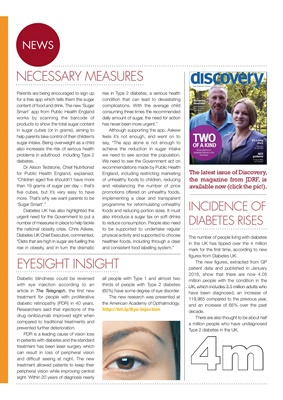
NEWS
INCIDENCE OF
DIABETES RISES
EYESIGHT INSIGHT
Diabetic blindness could be reversed
with eye injection according to an
article in the Telegraph, the first new
treatment for people with proliferative
diabetic retinopathy (PDR) in 40 years.
Researchers said that injections of the
drug ranibizumab improved sight when
compared to traditional treatments and
prevented further deterioration.
PDR is a leading cause of vision loss
in patients with diabetes and the standard
treatment has been laser surgery which
can result in loss of peripheral vision
and difficult seeing at night. The new
treatment allowed patients to keep their
peripheral vision while improving central
sight. Within 20 years of diagnosis nearly
4m
The number of people living with diabetes
in the UK has tipped over the 4 million
mark for the first time, according to new
figures from Diabetes UK.
The new figures, extracted from GP
patient data and published in January
2016, show that there are now 4.05
million people with the condition in the
UK, which includes 3.5 million adults
who have been diagnosed, an increase
of 119,965 compared to the previous
year, and an increase of 65 over the past
decade.
There are also thought to be about half
a million people who have undiagnosed
Type 2 diabetes in the UK.
Parents are being encouraged to sign up
for a free app which tells them the sugar
content of food and drink. The new 'Sugar
Smart' app from Public Health England
works by scanning the barcode of
products to show the total sugar content
in sugar cubes (or in grams), aiming to
help parents take control of their children's
sugar intake. Being overweight as a child
also increases the risk of serious health
problems in adulthood including Type 2
diabetes.
Dr Alison Tedstone, Chief Nutritionist
for Public Health England, explained,
"Children aged five shouldn't have more
than 19 grams of sugar per day - that's
five cubes, but it's very easy to have
more. That's why we want parents to be
'Sugar Smart'."
Diabetes UK has also highlighted the
urgent need for the Government to put a
number of measures in place to help tackle
the national obesity crisis. Chris Askew,
Diabetes UK Chief Executive, commented,
"Diets that are high in sugar are fuelling the
rise in obesity, and in turn the dramatic
NECESSARY MEASURES
rise in Type 2 diabetes, a serious health
condition that can lead to devastating
complications. With the average child
consuming three times the recommended
daily amount of sugar, the need for action
has never been more urgent."
Although supporting the app, Askew
feels it's not enough, and went on to
say, "The app alone is not enough to
achieve the reduction in sugar intake
we need to see across the population.
We need to see the Government act on
recommendations made by Public Health
England, including restricting marketing
of unhealthy foods to children, reducing
and rebalancing the number of price
promotions offered on unhealthy foods,
implementing a clear and transparent
programme for reformulating unhealthy
foods and reducing portion sizes. It must
also introduce a sugar tax on soft drinks
to reduce consumption. People also need
to be supported to undertake regular
physical activity and supported to choose
healthier foods, including through a clear
and consistent food labelling system."
all people with Type 1 and almost two
thirds of people with Type 2 diabetes
(60 per cent) have some degree of eye
disorder.
The new research was presented at
the American Academy of Opthalmology.
http://bit.ly/eye-injection
The latest issue of Discovery,
the magazine from JDRF, is
available now (click the pic!).